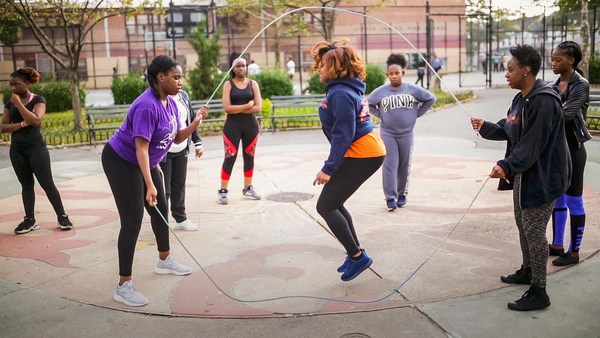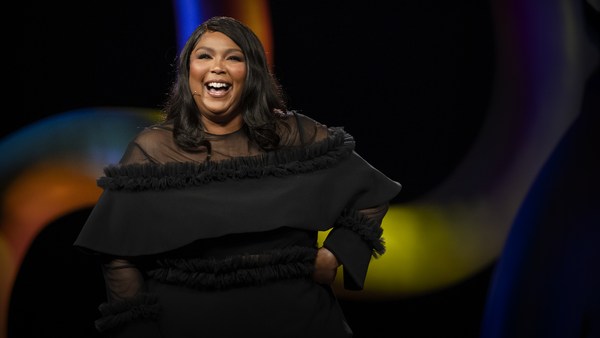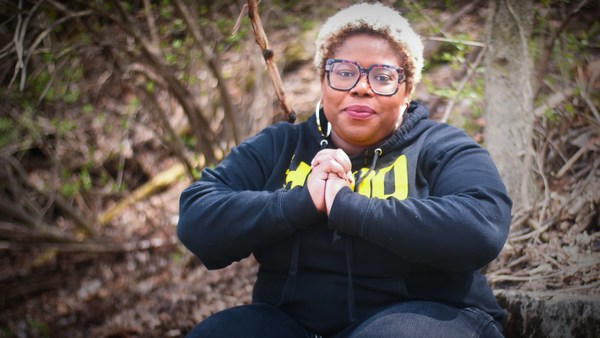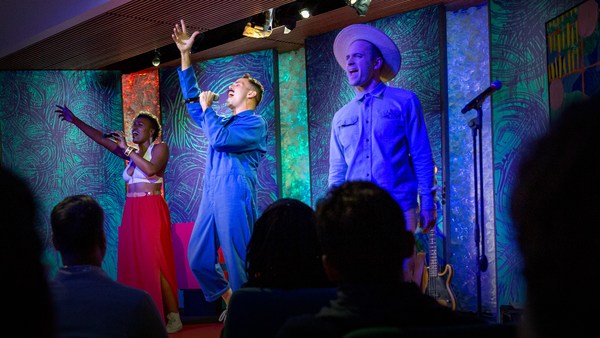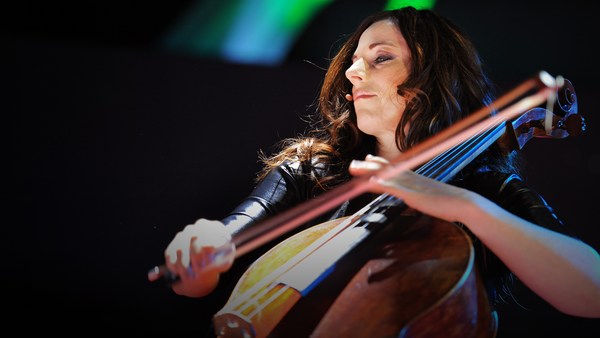I was on a date, just about to eat dinner, and I hear a growling sound. And I look at the guy, he says to me, "That's your stomach, not mine."
(Laughs)
How do I not recognize the sounds coming from my own body, not to mention my own voice?
I love the sound of my voice on a microphone, but it didn't start out that way. When I was younger, I was in love with other people's voices. And like so many of us, the first time I ever heard my voice on a recording, I hated it.
I was 10 years old when my mother bought me a Panasonic cassette recorder with a pack of Memorex cassette tapes for Christmas. See, singing on tape was my version of bedroom musical play, something that girls do all around the world, and it's really gendered. Left alone with our devices, alone in a room, girls play. Singing, listening to music, dancing. So with a gift in hand, the very next morning, the first thing I did was record my voice. And when I played the tape back, I was shocked. It didn't sound anything like me. There was a huge gap between what I thought I sounded like and what the tape was telling me. And it was traumatic because I didn't recognize me.
I think we all know that feeling. But some of us are emancipated from the doubt triggered by technology, and some of us are not. So I stuck to dancing in the mirror and lip synching, falling in love with other people's voices instead of my own.
Now I am a digital ethnomusicologist. I study Black tween girls, particularly the unintended consequences of their intimate bedroom musical play. On today's mobile apps, Black girls record and upload the most viral dances on the internet. But the songs that mute their voices and sound pornographic are overwhelmingly male. For example, the song "Booty Hopscotch" entices very young girls to record themselves while a male ventriloquist grooms them to "Keep that ass jumpin', Keep that ass jumpin'." Girls say they don't listen to the lyrics, but when asked, they can sing every word with no concern for the consequences.
Before YouTube, before WorldstarHipHop, the Black YouTube, on the playground and in the bedroom, the voices that Black girls heard in their own musical play were predominately their own. But these days, online Black girls are drowning in the sounds of musical mansplaining while bouncing ther booty to the beats and rhymes of rap that tops the Billboard and YouTube charts. Songs like, "Hands up, get low. hands up, get low, hands up," tell them what to do and how to do it. Curiously, the hook for that song may have come, may have been appropriated from a Black girls' hand-clapping game called "Jig-a-low." Jig-a-low is a contraction, “jig” meaning to dance and “a-low”, well, to get down. "Jig-a-low, jig-jig-a-low, I do my thing, yeah, on the video screen. Yeah, well, my hands up high, my feet down low. And this the way we jig-a-low. Hands up high, my feet down low. And this the way we jig-a-low.”
Girls across the gender spectrum, who love to twerk, which is a culturally appropriate and sophisticated style of dance found throughout the African and Afro-Latina diaspora, are being enticed by sounds that are produced, engineered and written 90 percent of the time by men who are enticing and taking advantage of girls who love to dance and treating them like adults in their intimate bedroom musical play. How do I know? For seven years, I've been studying a set of 650 bedrooms twerking videos by Black girls. They were uploaded to YouTube between 2006 and 2014. Over 1,000 girls from all around the world selected 200 twerk songs and only nine voices of women, including Nicki Minaj, Beyoncé, Ciara and one indie artist named Katie Got Bandz.
So what's behind all this? While girls are twerking, feeling themselves, feeling empowered, arguably the oldest technology in our human evolution, music, is taking over. Beyond our conscious thought, music lowers our threshold of pain while it rewards us with the feeling of social bonding and intimacy. That's why we go to concerts, that's why we crave that feeling even when we're alone, that's why music is self-soothing. And it is. It's a whole mood. But that mood is grooming younger and younger girls to tolerate psychological violence in dating situations and in their own intimate bedroom musical play.
Girls repeatedly do what they're repeatedly exposed to. Left to their own devices, music as technology gives patriarchy and anti-Blackness a head start. Faced with doubt about my own voice when I was ten, the tendency to think that the situation was about me, about feeling insecure, that was the tendency, not the situation. The role technology plays gets lost. Being best friends with my own voice could have been my first intimate relationship. If very young girls were surrounded by the voices of Black female voices, chances are they'd assign value to their own. Bedroom musical play could be the first time a girl tunes in to her own internal signals, self-regulates it, and learns to say "Yes!" as well as, "Nope, not today." But online, bedroom musical play, like listening to your gut or your stomach, well, it's not a solo act. Stereotypes and stigmas fed by algorithms and audiences are silencing us. But if Black girls produced their own twerk songs and preferred female musicians, well, they could break the internet in music and tech. But that revolution in sound can only begin if they learn to like the voice on their own Memorex tape.
Thank you.
(Applause)
